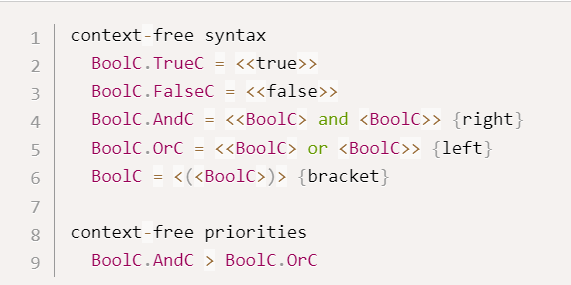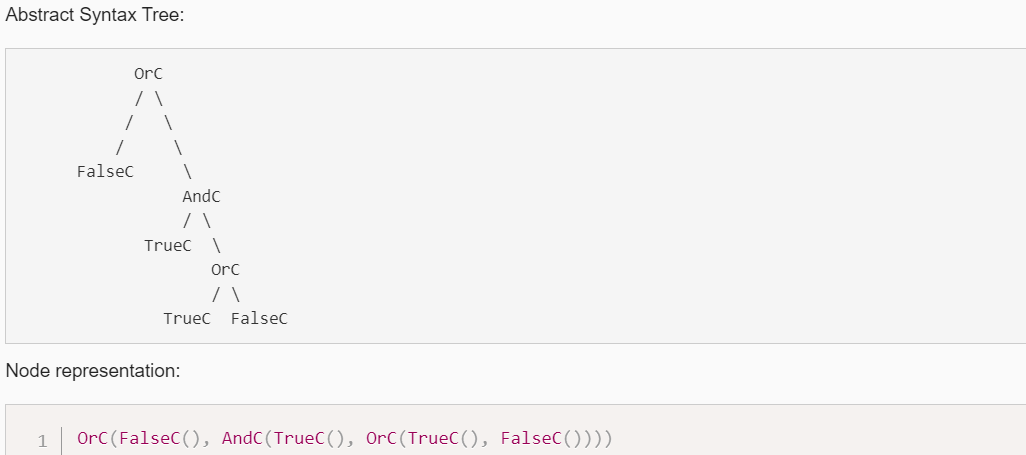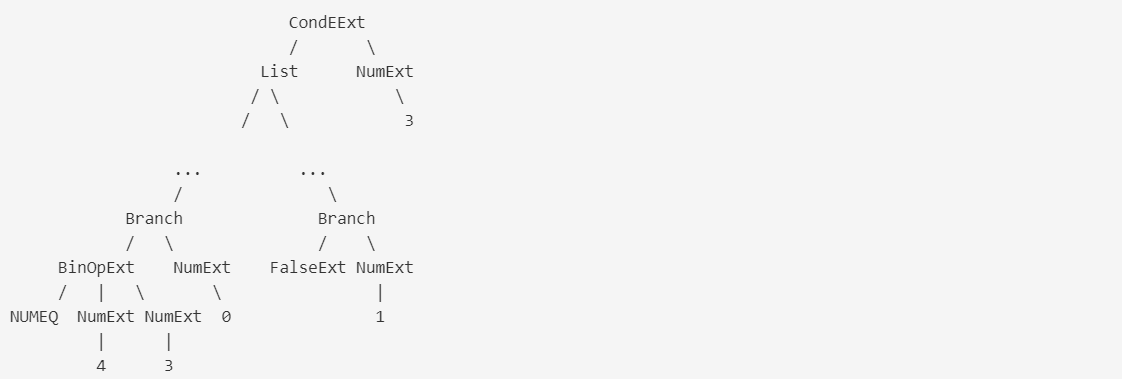반응형
목차
Parsing by Hand
Given the following grammar:

(1 + 2) * (1 + 4)를 AST와 Node Version으로 변환.

Given the following Grammar:

pi * r * r을 AST와 Node Version으로 변환.

Given the following grammar:

AndC가 OrC보다 먼저.
false or true and (true or false)

Paret
context-free syntax
Expr.NumExt = INT // integer literals
Expr.TrueExt = [true]
Expr.FalseExt = [false]
Expr.UnOpExt = [([UnOp] [Expr])]
Expr.BinOpExt = [([BinOp] [Expr] [Expr])]
UnOp.MIN = [-]
UnOp.NOT = [not]
UnOp.HEAD = [head]
UnOp.TAIL = [tail]
UnOp.ISNIL = [is-nil]
UnOp.ISLIST = [is-list]
BinOp.PLUS = [+]
BinOp.MULT = [*]
BinOp.MINUS = [-]
BinOp.AND = [and]
BinOp.OR = [or]
BinOp.NUMEQ = [num=]
BinOp.NUMLT = [num<]
BinOp.NUMGT = [num>]
BinOp.CONS = [cons]
Expr.IfExt = [(if [Expr] [Expr] [Expr])]
Expr.NilExt = [nil]
Expr.ListExt = [(list [Expr*])]
Expr.CondExt = [(cond [Branch+])]
Expr.CondEExt = [(cond [Branch+] (else [Expr]))]
Branch.Branch = [([Expr] [Expr])]
(+ (* 152 390) 23)

(if (num> (+ 2 3) 4)
10
2
)
(cons 1 (cons 2 (cons 3 nil)))

(is-nil (list 2 3 5 8 13))

(cond
((num= 4 3) 0)
(false 1)
(else 3)
)
Mandatory Assignments
과제: Take an s-expression and returns an AST (ExprExt).
1. Basics
case SNum(n) => NumExt(n)
case SSym("true") => TrueExt()
case SSym("false") => FalseExt()
case SSym("nil") => NilExt()
2. Unary operators
case SList(SSym("-") :: l :: Nil) => UnOpExt("-", parse(l))
case SList(SSym("not") :: l :: Nil) => UnOpExt("not", parse(l))
case SList(SSym("head") :: l :: Nil) => UnOpExt("head", parse(l))
case SList(SSym("head") :: l :: Nil) => UnOpExt("head", parse(l))
case SList(SSym("tail") :: l :: Nil) => UnOpExt("tail", parse(l))
case SList(SSym("is-nil") :: l :: Nil) => UnOpExt("is-nil", parse(l))
case SList(SSym("is-list") :: l :: Nil) => UnOpExt("is-list", parse(l))
3. Binary Operators
case SList(SSym("+") :: l :: r :: Nil) => BinOpExt("+", parse(l), parse(r))
case SList(SSym("-") :: l :: r :: Nil) => BinOpExt("-", parse(l), parse(r))
case SList(SSym("*") :: l :: r :: Nil) => BinOpExt("*", parse(l), parse(r))
case SList(SSym("num=") :: l :: r :: Nil) => BinOpExt("num=", parse(l), parse(r))
case SList(SSym("num<") :: l :: r :: Nil) => BinOpExt("num<", parse(l), parse(r))
case SList(SSym("num>") :: l :: r :: Nil) => BinOpExt("num>", parse(l), parse(r))
case SList(SSym("and") :: l :: r :: Nil) => BinOpExt("and", parse(l), parse(r))
case SList(SSym("or") :: l :: r :: Nil) => BinOpExt("or", parse(l), parse(r))
case SList(SSym("cons") :: l :: r :: Nil) => BinOpExt("cons", parse(l), parse(r))
4. If statement
case SList(SSym("if") :: c :: t :: e :: Nil) => IfExt(parse(c), parse(t), parse(e))
5. List
case SList(SSym("list") :: Nil) => ListExt(Nil)
case SList(SSym("list") :: t) => ListExt(parseList(t))
def parseList(t: List[SExpr]) : List[ExprExt] = t match {
case Nil => Nil
case h :: t => parse(h) :: parseList(t)
}
우선 Empty List, 즉 SList(SSym("list) :: Nil)일 경우에는 ListExt(Nil) 반환.
만약에 empty list가 아닌 경우에는 helper function을 따로 만든다.
6. Multi-Armed Conditional
Multi-Armed Conditional은 다음과 같은 형태가 있다.
(cond (e00 e01) (e10 e11) ... (en0 en1))
(cond (e00 e01) (e10 e11) ... (en0 en1) (else e))
case SList(SSym("cond") :: t) => parseCond(t)
def parseCond(t: List[SExpr]) : ExprExt = t match {
case Nil => throw new ParseExceptionImpl("")
case SList(x :: y :: Nil) :: SList(SSym("else") :: z :: Nil) :: Nil => CondEExt(List((parse(x), parse(y))), parse(z))
case SList(x :: y :: Nil) :: Nil => CondExt(List((parse(x), parse(y))))
case SList(x :: y :: Nil) :: tail => parseCond(tail) match {
case CondEExt(condition, e) => CondEExt((parse(x), parse(y)) :: condition, e)
case CondExt(condition) => CondExt((parse(x), parse(y)) :: condition)
case _ => throw new ParseExceptionImpl("")
}
case _ => throw new ParseExceptionImpl("")
}
1. (cond (e00 e01) (else e))일 경우:
parseCond에 두번째 condition
case SList(x :: y :: Nil) :: SList(SSym("else") :: z :: Nil) :: Nil => CondEExt(List((parse(x), parse(y))), parse(z))
2. (cond (e00 e01)일 경우:
case SList(x :: y :: Nil) :: Nil => CondExt(List((parse(x), parse(y))))
3. 만약에 condition이 하나가 아니라 여러개이면:
case SList(x :: y :: Nil) :: tail => parseCond(tail) match {
case CondEExt(condition, e) => CondEExt((parse(x), parse(y)) :: condition, e)
case CondExt(condition) => CondExt((parse(x), parse(y)) :: condition)
case _ => throw new ParseExceptionImpl("")
}
반응형
'학교 > CPL' 카테고리의 다른 글
| Lecture 4: Functions (1) | 2024.03.27 |
|---|---|
| CPL 1-2: Semantics and Transformations (0) | 2024.03.26 |
| Lecture 3: Semantics & Transformations (1) | 2024.03.26 |
| Lecture 2: Syntax & Parsing (1) | 2024.03.25 |
| Lecture 1: Introduction (0) | 2024.03.19 |




댓글